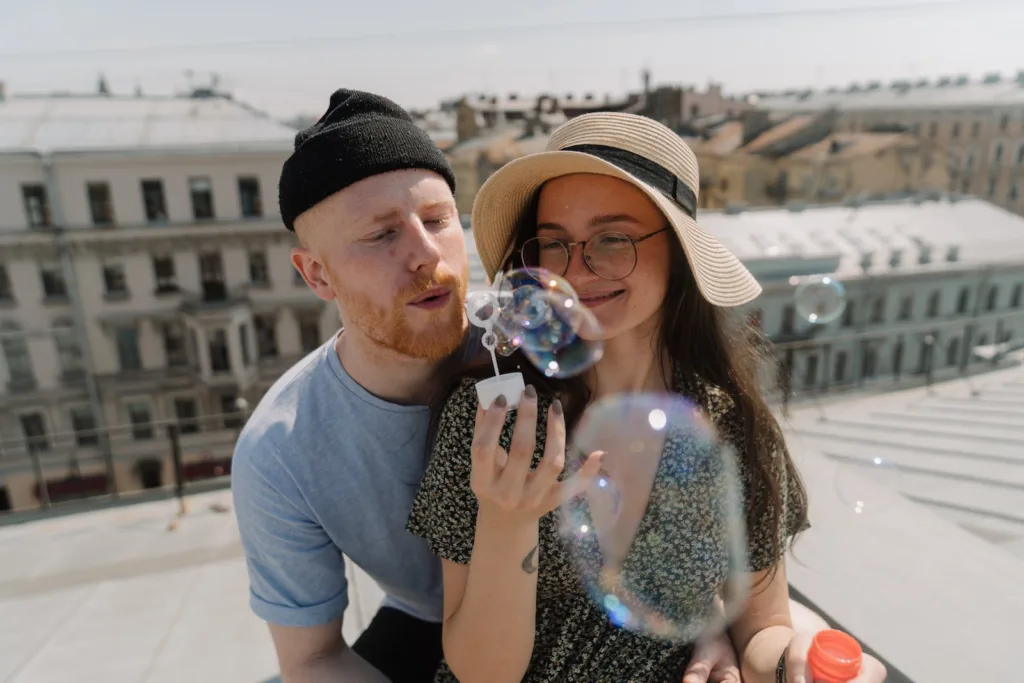You might not be aware, but love and infatuation have clear differences that extend beyond mere feelings and having healthy relationships.
While infatuation usually involves intense emotions and a strong pull towards someone. It can make your heart race and fill you with excitement quickly. Infatuation is often about the immediate physical attraction and the rush of feelings you get, but it might not last.
Love, on the other hand, offers a deeper emotional bond and a commitment for the long term. It grows over time, based on mutual respect, understanding, and shared experiences. It’s about being there for each other, even when things get tough.
Getting to know these differences is key in handling relationships and creating a more satisfying romantic life.
So, what distinguishes love from infatuation, and how can you spot the signs?
Understanding the difference can help you steer clear of potential heartache and invest your emotions wisely. It’s all about recognizing whether you’re in it for the thrill of the moment or if you’re ready to build something that stands the test of time.
Key Takeaways
- Love is characterized by a strong emotional bond and long-term commitment, while infatuation involves intense emotions and a strong pull towards someone.
- Infatuation is often based on immediate physical attraction and intense feelings, whereas love grows over time through mutual respect, understanding, and shared experiences.
- Signs of infatuation include overly idealizing someone, physical reactions like sweaty palms, obsessive thoughts and actions, and neglecting other aspects of life.
- Love is characterized by a deep emotional connection, mutual admiration, the ability to compromise, and support each other’s growth and dreams, and a stable relationship that values partnership above all.
Understanding Love and Infatuation
To tell love and infatuation apart, it’s vital to grasp what sets them apart and the feelings they stir up.
Love is characterized by a strong connection, a comforting assurance, and a readiness to share values, goals, and dreams with your other half. It’s about choosing to explore new experiences together and accepting life’s realities, both the good and the bad.
Contrastingly, infatuation is all about an intense feeling of joy, unclear emotions, and strong desire. It often leads to telling friends you’re deeply in love and feeling fixated on the person.
While infatuation might be the initial phase of love, transitioning to a deeper and lasting love demands slowing down, opening up about vulnerabilities, and moving past illusions.
Within a relationship, signs of infatuation include the rapid development of intense feelings and a desire to be together all the time.
Meanwhile, signs of love include feelings that grow over time and a sense of comfort and peace with the person.
It’s key to recognize that infatuation can skew our view, making everything seem ideal, while love accepts life’s full spectrum – the good, the bad, and the difficult.
In addition, grasping these differences is key to fostering a healthy, satisfying relationship. By understanding what defines both love and infatuation, you can manage your emotions and experiences with more insight and intention.
Signs of Infatuation
Understanding the signs of infatuation is key to navigating the complex waters of relationships. Especially when moving beyond the initial flood of intense emotions toward a deeper, more enduring connection.
Recognizing these signs can help you avoid confusing infatuation with true love. Here are some indicators to watch for:
- Overly Idealizing Someone: When infatuated, you might find yourself proclaiming to everyone that you’re deeply in love, often putting the person on a pedestal while overlooking any potential warning signs.
- Physical Reactions: Common signs of infatuation include sweaty palms, feeling nervous, and not being able to stop thinking about the person, indicating your body’s intense reaction to them.
- Daydreams and Unrealistic Perceptions: Engaging in daydreams and holding an unrealistic view of the person, driven by strong physical attraction, are typical signs of infatuation. You catch yourself imagining a perfect, yet unlikely future together.
- Obsession with Looks: A hallmark of infatuation is an intense focus on the other person’s looks and outward behavior, leading to a shallow form of attraction. This often comes with a hesitance to show your flaws.
- Obsessive Thoughts and Actions: Infatuation can spiral into obsession, where you can’t stop thinking about the person. This might lead to trying to control situations to keep them close and neglecting other parts of your life. Focusing becomes difficult as your thoughts continually drift back to them.
Recognizing these behaviors can steer you towards understanding the difference between infatuation and love, fostering healthier, more rewarding relationships.
Recognizing Infatuation’s Signs
Meanwhile, being overly focused on someone, to the point where you constantly think about them and overlook their flaws, can signify infatuation. It’s vital to recognize these signs to handle them wisely. Here are some indicators:
- Constantly thinking about the individual
- Putting the person on a pedestal while ignoring warning signs
- Feeling nervous or excited physically, like having a fluttery feeling in your stomach
- Paying too much attention to how the person looks or other surface-level traits
- Moving from a state of intense admiration to genuine love means taking things slower and distancing yourself from unreal expectations
Managing Love and Infatuation in Relationships
When handling strong, immediate attractions in relationships, it’s key to spot the characteristics of infatuation and understand how they differ from real love.
Open discussions with your partner about your emotions and worries are crucial for maintaining a balanced connection.
Developing emotional maturity through personal reflection and being mindful can assist in dealing with infatuation and maintaining a rewarding relationship.
Characteristics of Love
Recognizing the defining traits of love is crucial. Meanwhile, a true emotional bond and a dedication to each other over time are central elements of love. Grasping these aspects can help you tell the difference between love and mere attraction.
In understanding love, it’s vital to see it as a deep emotional connection and a lasting commitment. Therefore, this insight can assist in distinguishing love from mere infatuation.
Love and Infatuation: Genuine Emotional Connection
In love, the essence of a true emotional connection lies in the continuous emotional bonds, mutual admiration, and a profound dedication to each other’s happiness and growth.
Meanwhile, this real bond is about sharing vulnerabilities, engaging in deep discussions on values and aspirations, and experiencing a significant connection with your partner.
To truly distinguish love from mere infatuation, pay attention to the following critical aspects of a real emotional connection:
- Mutual admiration and the ability to compromise
- Supporting one another’s growth and dreams
- A stable relationship that values the partnership above all
- Shared visions and objectives for the future
- A robust physical and sexual connection, alongside showing love through touch
These aspects are the pillars of a true emotional connection in love, setting it apart from infatuation.
Long-Term Commitment
Creating a lasting bond in love requires unwavering commitment. As well as an ongoing effort to nurture the relationship’s health and growth.
Unlike short-lived infatuation, true love is about sticking together through thick and thin. It demands patience, empathy, and the readiness to face challenges together over the long term.
While, building a foundation of mutual respect, trust, and shared goals is crucial for a deep, enduring commitment. It involves making the relationship a priority and continuously fostering its growth.
Emotional closeness, support for one another, and a strong emotional connection are key to a lasting commitment in love.
It’s about supporting each other, facing hardships together, and constantly contributing to the flourishing of the relationship. In essence, a deep commitment is the foundation that strengthens the bond and keeps the connection alive.
Transition From Infatuation to Love
Transitioning from infatuation to love means evolving beyond initial excitement to form a deeper, more meaningful bond with your partner. Additionally, this shift involves growing together and accepting each other’s imperfections. Here are some critical steps to consider during this evolution:
- Self-Reflection: Spend time understanding your feelings and what drives them. Ask yourself if you’re genuinely ready to move from the rush of infatuation to the depth of love, or if you’re still caught up in seeking excitement.
- Be Open and Genuine: Sharing your true self with your partner is crucial. Authenticity paves the way for a love that’s rooted in reality, not just an ideal.
- Accept Imperfections: Recognize and accept your partner as they truly are, complete with their flaws. Love is about embracing the whole person, not just an idealized image.
- Communicate Clearly: Having open and honest discussions about your emotions, concerns, and aspirations for the relationship is vital as you move forward.
- Prioritize and Compromise: Moving from infatuation to love means being ready to put your partner’s and the relationship’s needs above your desires. True love involves both compromise and sacrifice.
As you make the shift from infatuation to love, understand that it’s a journey requiring patience, empathy, and a real desire for deep connection.
By focusing on these steps, you can develop a love that’s deep, lasting, and enriching.
Cultivating Deeper Connections
To transition from infatuation to love, it’s crucial to cultivate deeper connections that go beyond surface-level attraction:
- Communication: Honest and open communication fosters understanding and strengthens emotional bonds. Being honest and open with your partner allows you to express your thoughts, feelings, and concerns effectively. By actively listening to each other and communicating openly, you can foster understanding and strengthen your emotional connection. Whether it’s discussing your day, addressing conflicts, or sharing your deepest desires, communication lays the groundwork for a strong and lasting bond.
- Shared Experiences: Creating meaningful memories together deepens your connection and builds a foundation for love. Whether it’s traveling to new places, trying new hobbies, or simply spending quality time together, these shared moments create a foundation for love to flourish. When you engage in activities that you both enjoy, you strengthen your bond and create a stronger sense of connection.
- Emotional Intimacy: Sharing fears, dreams, and vulnerabilities fosters intimacy and builds trust. By allowing yourself to be vulnerable and opening up to each other, you build trust and deepen your emotional connection. When you feel safe and supported in expressing your true self, you create a strong sense of intimacy that forms the basis of a loving relationship.
Longevity of Infatuation
Moving beyond the initial thrill of infatuation, it’s useful to think about how long this phase might last in your relationship.
Infatuation, often marked by a sudden rush of passion and a feeling of love at first sight, can be quite thrilling. This period may span from a few weeks to months, though it differs for every individual and relationship.
In certain cases, the early excitement of infatuation can stretch for years. However, it’s better to aim to develop your relationship further rather than worrying about how long the infatuation lasts.
Recognizing that there’s no universal timeline for the infatuation stage in relationships is key. It’s more beneficial to focus on the process of falling in love than to concentrate on how long infatuation lasts.
Infatuation can evolve into love as you start accepting disappointments. Showing a readiness to contribute, and moving from focusing on your desires to making sacrifices and compromises for your partner.
While infatuation might occur instantly, moving toward deeper levels of love and commitment is far more significant for the lasting health of a relationship.
It’s easy to mix up infatuation with love, but what’s truly vital is your ability to develop and deepen the relationship after the initial excitement of infatuation.
By working on building a solid foundation for a meaningful, enduring connection, you can ensure that your relationship continues to flourish long after the initial rush has faded.
Love and Infatuation: Communicating Feelings Openly
Handling strong feelings in a relationship requires making a space where it’s safe to share emotions and confront any unrealistic hopes.
It’s crucial to talk about feelings openly to tell the difference between love and a brief crush. This means being honest and open, allowing yourself to share your feelings without worrying about being judged.
When both people in the relationship can talk about their thoughts and feelings freely, it leads to a better understanding of what each person needs and wants.
Discussing emotions and desires openly is key to building a relationship that’s based on real love, not just a temporary crush.
Listening carefully and showing understanding when talking about feelings helps create a close emotional connection and makes the relationship stronger.
Building Emotional Maturity
Developing emotional maturity means understanding the distinction between infatuation and love, which is crucial for creating a fulfilling relationship.
To cultivate emotional maturity when dealing with infatuation in relationships, keep these insights in mind:
- Emphasize clear communication, mutual respect, and deep commitment.
- Recognize that being addicted to love, having a fearful approach to attachment, and suffering from low self-esteem can obstruct the path from infatuation to love.
- Make real love, common values, and sharing new experiences a priority to maintain a healthy level of infatuation.
- Don’t underestimate the value of friendship within a romantic relationship, as it greatly contributes to loyalty, warmth, and mutual support.
- Be aware of how much our biology influences our feelings and how we experience love and infatuation.
To grow emotionally mature, one must carefully and consciously work through the intricacies of love and infatuation with an understanding of oneself.
Commitment in Love and Infatuation
In love, commitment signifies a profound, purposeful connection characterized by honest communication, respect, and loyalty, which nurtures a lasting bond and shared growth. It’s about being there and taking responsibility, especially during tough times.
Being committed in love entails continuously working on the relationship, making sacrifices, and putting your partner’s happiness first.
This kind of commitment stems from a strong emotional tie and a shared understanding of each other’s fundamental values and beliefs. It’s about facing challenges together and celebrating successes as a united front.
Conversely, commitment during infatuation might be more short-lived and based on immediate feelings. It usually centers on the excitement of something new and the intensity of initial emotions.
While infatuation can be overwhelmingly intense, it typically focuses on the here and now and the thrill of fresh encounters, rather than the future health of the relationship.
Commitment at this stage may not have the necessary depth and endurance to overcome the complexities of a durable partnership.
Progressing from infatuation to love means moving from an intense, often idealized attraction to a more solid, genuine connection.
This shift demands a deeper commitment to truly understand and connect with your partner on a significant level. It requires opening up, sharing hopes and fears, and being open to growing together.
Genuine commitment to love involves a readiness to invest in the relationship over the long term, facing life’s challenges with steadfast support and commitment.
Conclusion
Grasping the distinction between love and infatuation is key to nurturing healthy and rewarding connections.
Infatuation thrives on intense, but often temporary emotions, whereas love grows from a foundation of deep emotional ties, shared respect, and a willingness to commit over the long haul.
By identifying the signs of infatuation and adopting the qualities of love, you can transform your relationship from a short-lived passion to a lasting and significant bond.
Frequently Asked Questions
How Do You Tell the Difference Between Love and Infatuation?
Distinguishing between infatuation and love is a matter of emotional insight and taking your time. At the start of a relationship, infatuation can cause sharp, temporary feelings, whereas love develops gradually, forming a profound, enduring connection.
To understand the difference, it’s crucial to consider the subtle aspects of your emotions and watch how they change over time. It involves being truthful with yourself and your partner and accepting the process of finding out what real love means for you.
Is Infatuation Deeper Than Love?
Infatuation isn’t deeper than love. While it can be intense, it doesn’t have the emotional depth and commitment that comes with love.
The love feelings develop gradually, anchored in trust and vulnerability. It involves accepting each other’s imperfections and offering support.
Love fosters a deeper, more lasting bond than infatuation, which might initially appear overwhelming.
It’s about creating something real and significant, not just temporary feelings of emotion.
How Do You Know if It’s Love and Infatuation?
You can tell it’s infatuation when you feel an overwhelming rush of happiness and an all-consuming interest in someone. Your emotions are intense, but your clear thinking might be a bit unclear.
Take a moment to consider your feelings. Are they rooted in a real connection, or are they mostly about physical attraction? True love is about a deep emotional bond and making decisions with a clear head.
Trust what you feel deep down and keep an eye out for signs of genuine affection, a readiness to meet in the middle, and a view towards a future together. These signs point to real love.
Do I Like Him or Is It Just Infatuation?
You might find yourself genuinely liking him if there’s a strong bond and you enjoy each other’s company. Being in tune with your feelings is crucial. If his presence brings you peace and happiness, then it’s likely more than just a fleeting attraction.
Building a relationship requires honest communication and respecting each other. Love often grows gradually, founded on a solid friendship. Give yourself time and listen to your intuition to figure out if this is love or just a temporary fascination.
Additional Resources
- Infatuation Versus Love: How Different Are They?
- Infatuation vs. Love: How Can You Tell the Difference?
- Infatuation vs. Love: How To Tell If You’re Just Infatuated





